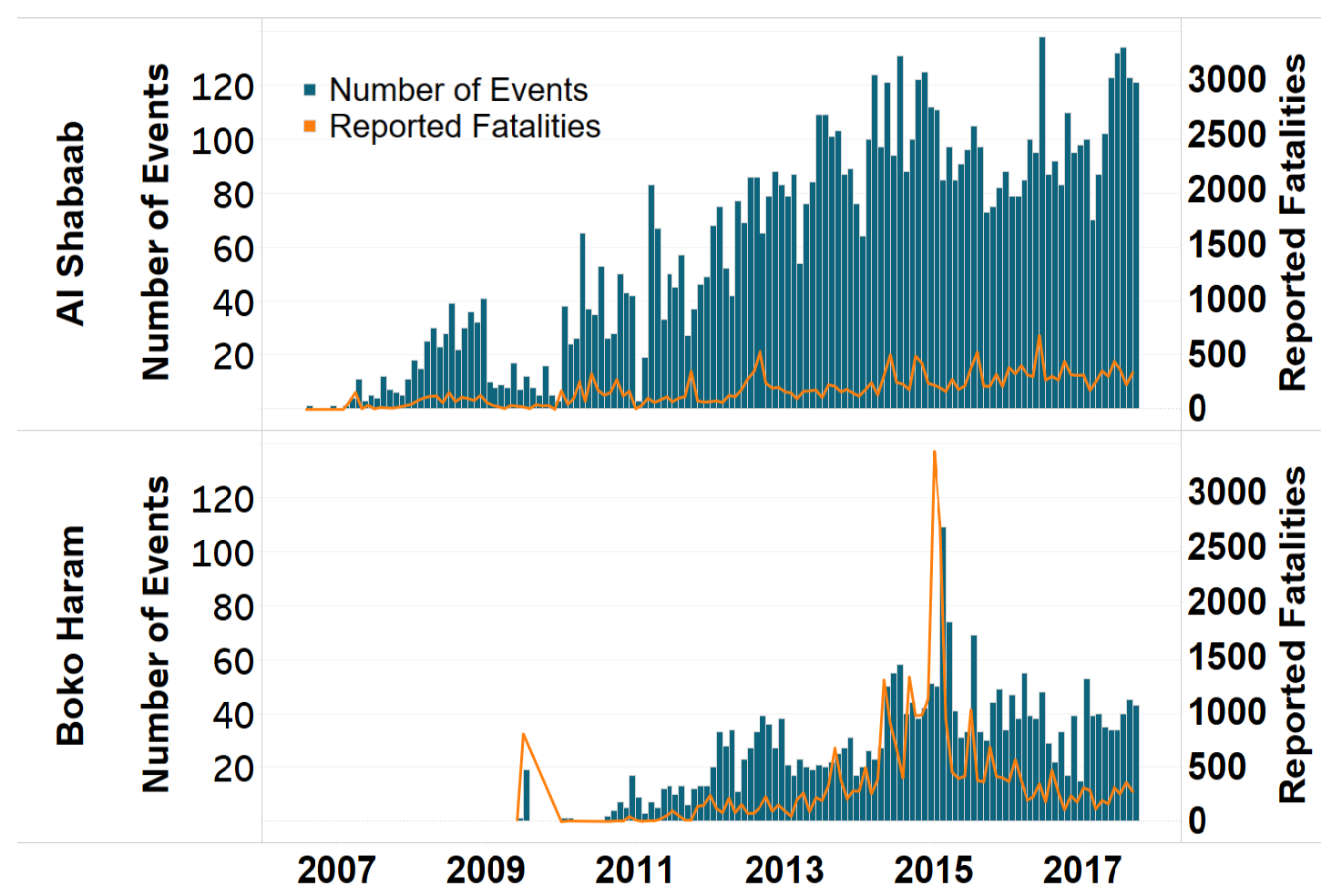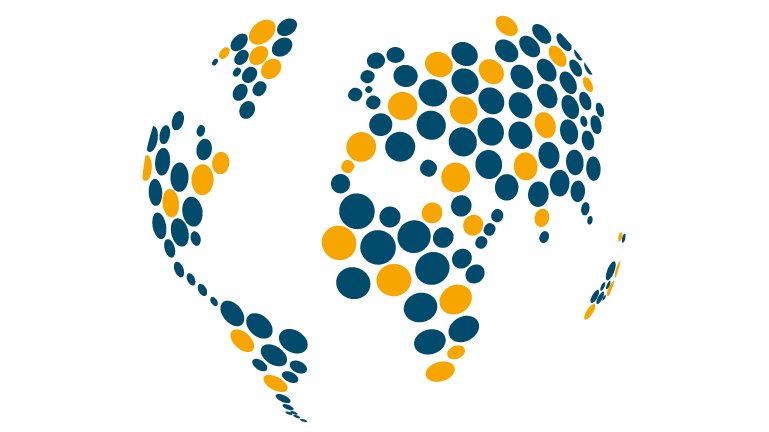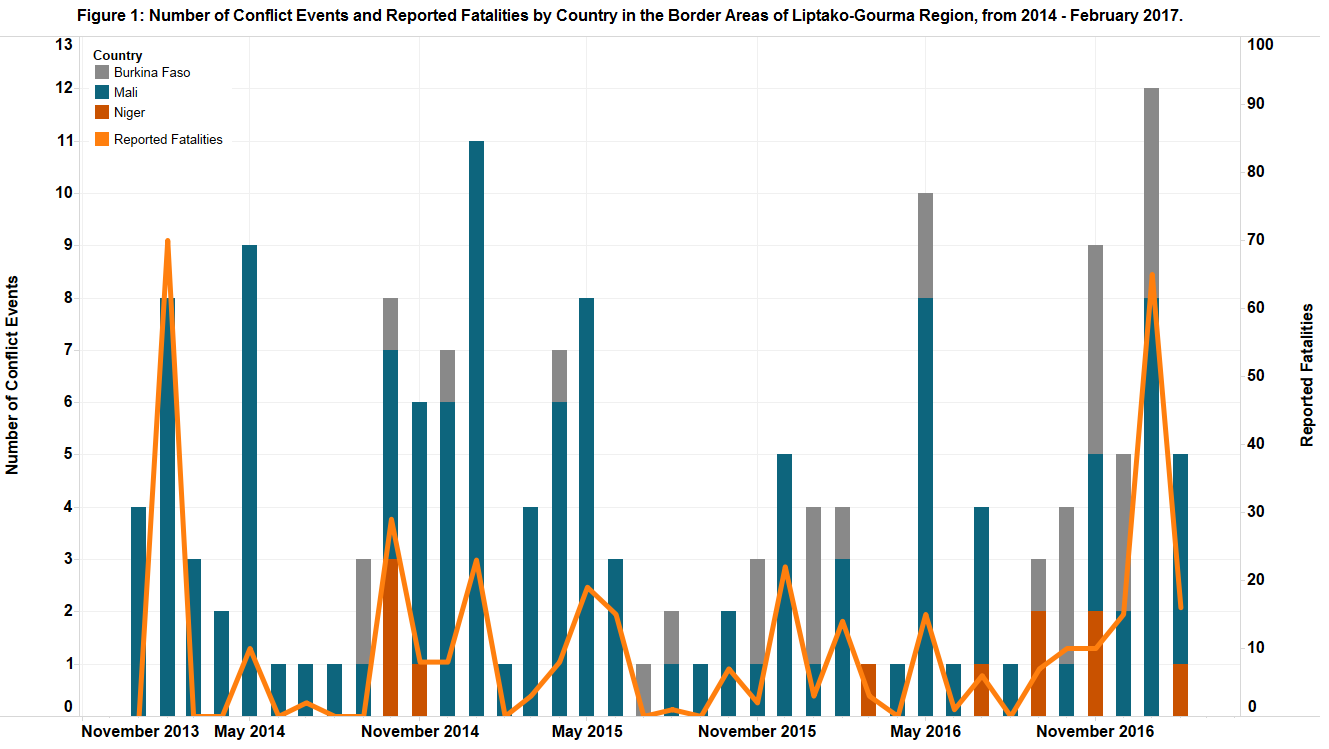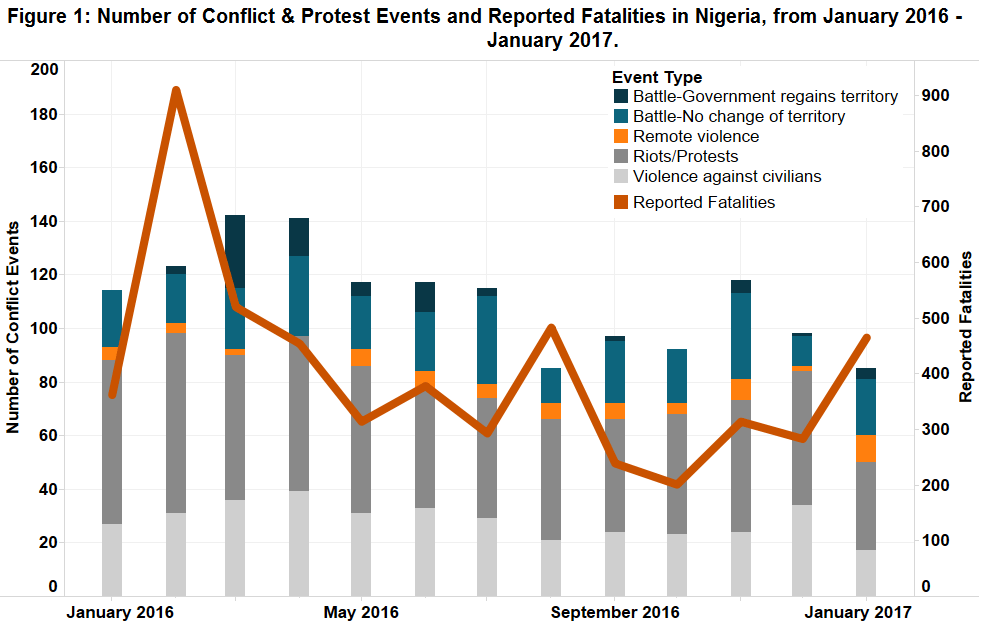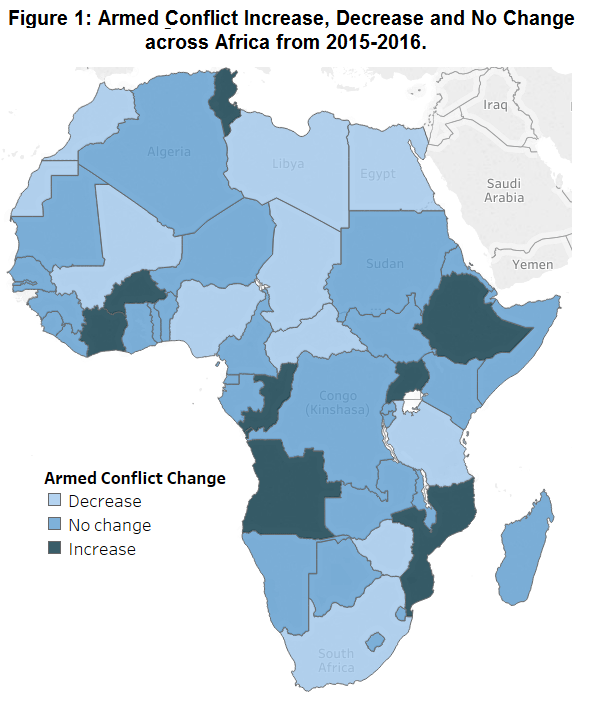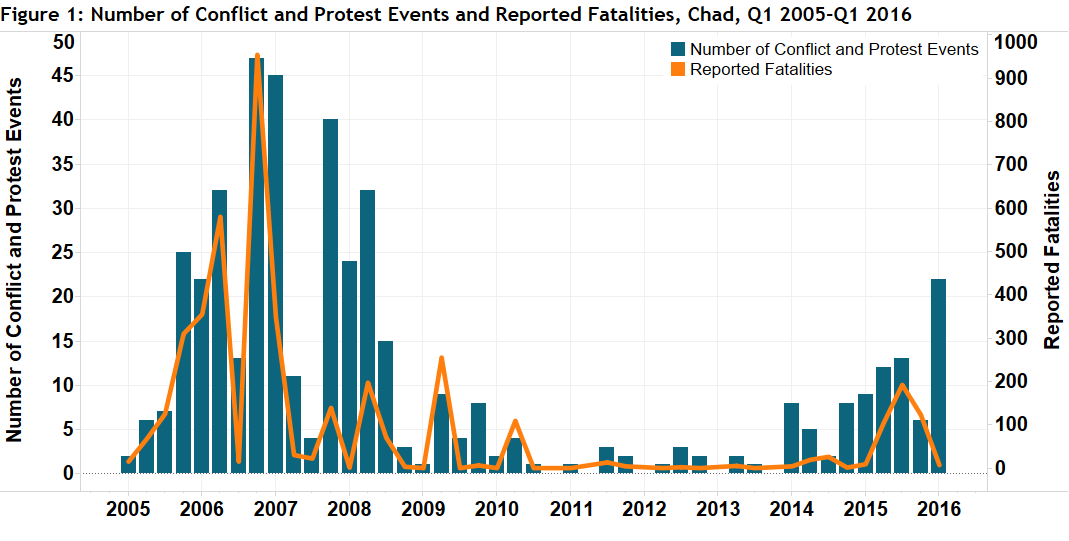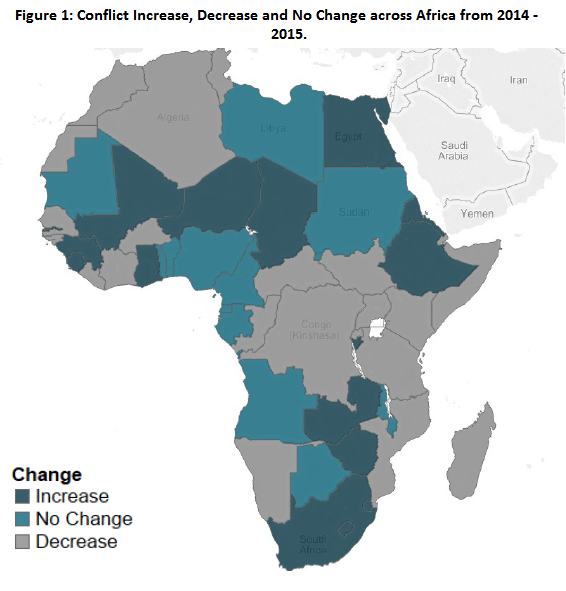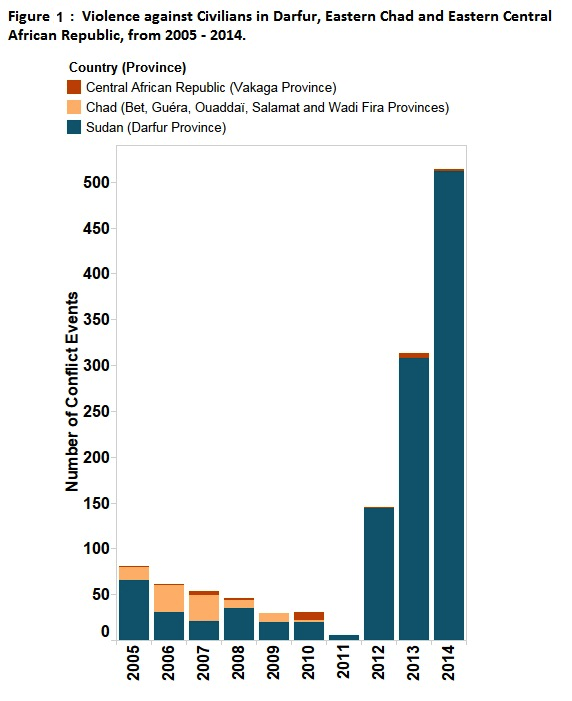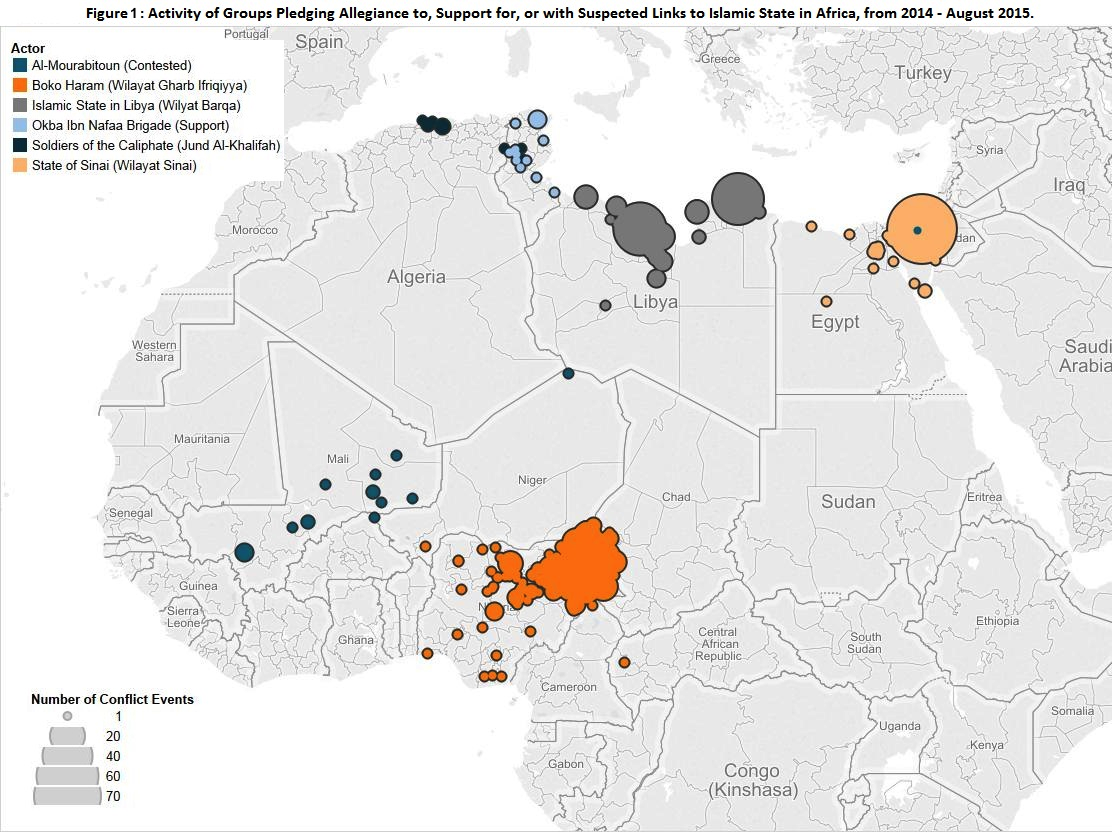Al Shabaab and Boko Haram: Patterns of Violence
9 October 2017
Which group is the most violent in Africa? A recent report exploring Africa’s active militant Islamic groups aimed to tackle this question. The report, produced by the Africa Center for Strategic Studies (ACSS), argued that Somalia’s Al Shabaab has eclipsed Nigeria’s Boko Haram, to become “Africa’s deadliest group”. The claim was supported with data drawn…
- Africa
- Al Shabaab
- Analysis
- Boko Haram
- Islamic State
- Political Stability
- Unidentified Armed Groups
- Violence Against Civilians
Burkina Faso – October 2017 Update
9 October 2017
January 2016 began a string of violence by militant Islamist groups in West Africa that moved beyond the “arc of insecurity” reaching from Mali in the north to the Lake Chad basin in the east. This first attack was carried out by the Al-Qaeda-affiliated Al-Mourabitoun group on a hotel and restaurant frequented by foreigners in…
- Analysis
- Improvised Explosive Devices
- Islamic State
- Islamist Violence
- Political Stability
- Violence Against Civilians
Conflict Summaries of Hotspots of Political Violence – June 2017
17 July 2017
Chad With 170 fatalities, June 2017 saw Chad’s highest monthly total of reported fatalities in the past decade. The fatalities occurred during a three-day battle between June 23-25 that saw the Chadian army and Boko Haram militants clash around a series of islands near the Nigerian border in the Bol area of Lac region. This…
- Africa
- AMISOM
- Analysis
- Civilians At Risk
- Current Hotspots
- Focus On Militias
- Islamic State
- Violence Against Civilians
Insecurity in the Liptako-Gourma Region
10 March 2017
On 24 January, the leaders Burkina Faso, Mali and Niger met in Niamey under the auspices of the Liptako-Gourma Authority (LGA). The goal of this sub-regional organization is to allow these three countries to coordinate the development of the Liptako-Gourma region (Sahel Standard, 24 January 2017), which includes, in whole or in part, nineteen provinces…
Read MoreNigeria – January 2017 Update
7 February 2017
Over the course of 2016, Nigeria witnessed a general downward trend in violence starting in March 2016. However, a significant spike of over 900 fatalities recorded in February preceded this downward trend, which was almost 550 more than the month before (see Figure 1). Out of the total fatalities recorded in February, 358 were reported…
- Africa
- Analysis
- Boko Haram
- Current Hotspots
- Famine
- Remote Violence
- Rioting And Protests
- Violence Against Civilians
Overview of Continental Trends 2016
7 February 2017
African states experienced high rates of both political violence and protest in 2016 (see Figure 2). The aggregated totals are remarkably similar to those of 2015, which indicates three important lessons going forward: The crisis points on the continent- Libya, South Sudan, Somalia, and Nigeria- continue to produce significant violence, with substantial harm to civilians…
- Africa
- Boko Haram
- Civilians At Risk
- Current Hotspots
- Education
- Focus On Militias
- Remote Violence
- Rioting And Protests
- Violence Against Civilians
Chad — April 2016 Update
8 April 2016
Chad witnessed an increase in domestic protest in early 2016. This spike in political unrest represents a distinct departure in what has been a consistently low activity country from 2010 onwards (see Figure 1). A low level of political violence and unrest can be at least partially attributed to the thawing of relations between Presidents…
- Africa
- Analysis
- Boko Haram
- Civilians At Risk
- Elections
- Political Stability
- Violence Against Civilians
African Overview 2015
22 January 2016
In 2015, ACLED recorded 14,640 conflict events on the African continent. Armed conflict decreased by 14.0% compared to the previous year, marking the first negative trend since 2009. In a number of high-activity countries, including Central African Republic, Kenya, Democratic Republic of Congo and Somalia, conflict levels declined by more than 20% over one year.…
- Africa
- Civilians At Risk
- Current Hotspots
- Focus On Militias
- Local-Level Violence
- Political Stability
- Pro-Government Militias
- Remote Violence
- Rioting And Protests
- Violence Against Civilians
The Geographic Profile of Violence against Civilians during Peacekeeping Deployment — Containment and Diffusion
4 September 2015
Investigating the ability of peacekeeping (PK) missions to reduce levels of violence against civilians (VAC) requires an assessment of whether these deployments control the spread of anti-civilian actions. Previous studies contend that PK operations prevent contagion and reduce the scope of rebel violence by reducing their external shelters and restricting their ability to move (Beardsley,…
Read MoreThe Prospects of Islamic State Expansion into Africa & an Analysis of State and Non-State Actor Strategies
4 September 2015
In November 2014, The Islamic State’s recruitment and propaganda publication ‘Dabiq’ announced a strategy to ‘remain’ and ‘expand’ (The Clarion Project, 21 November 2014) in order to consolidate its existing territorial presence whilst spreading the caliphate regionally, and eventually globally to promote disorder and disruption. To date, this stated objective has held true; the group…
- Africa
- Civilians At Risk
- Current Hotspots
- Islamic State
- Islamist Violence
- Political Stability
- Violence Against Civilians


